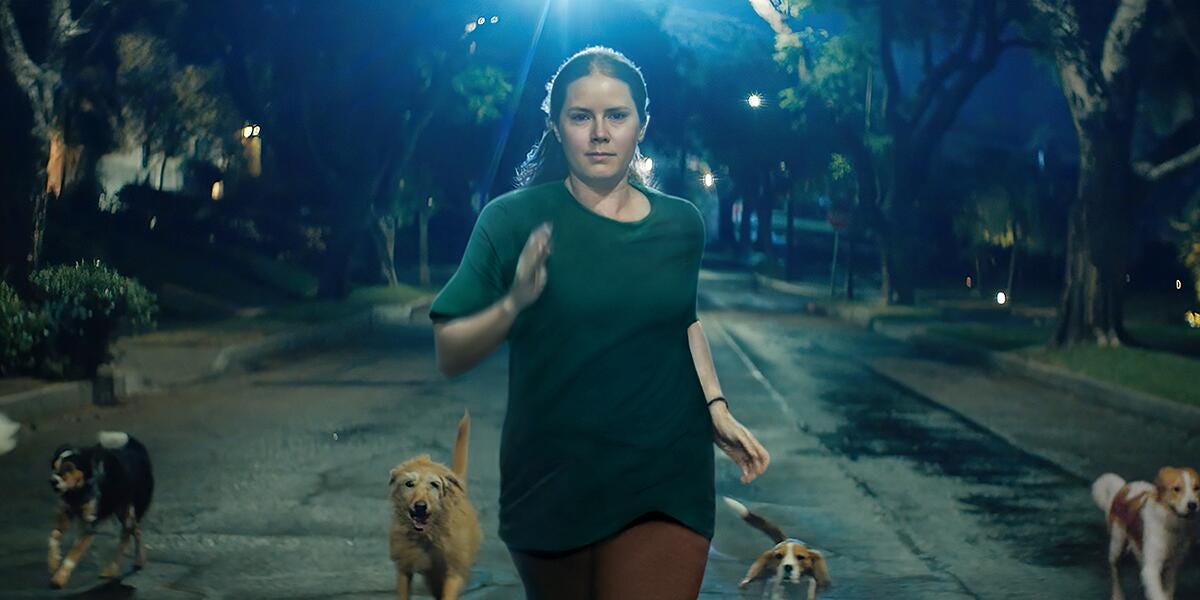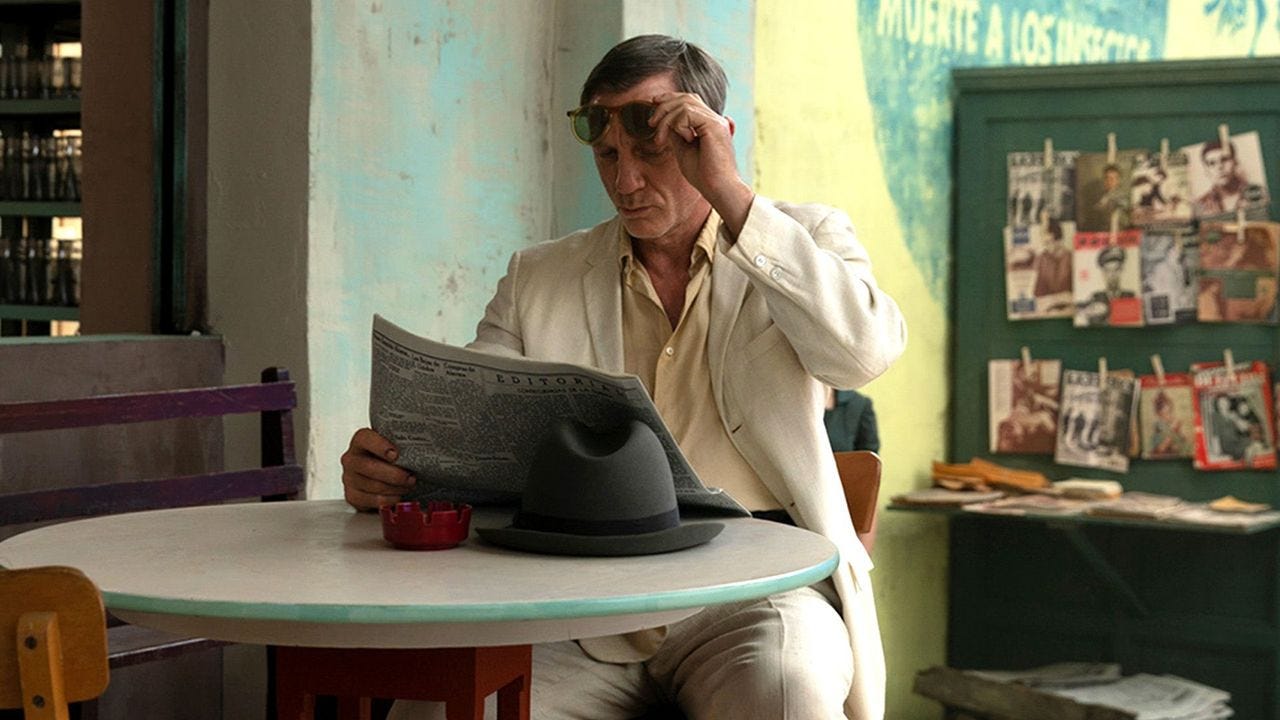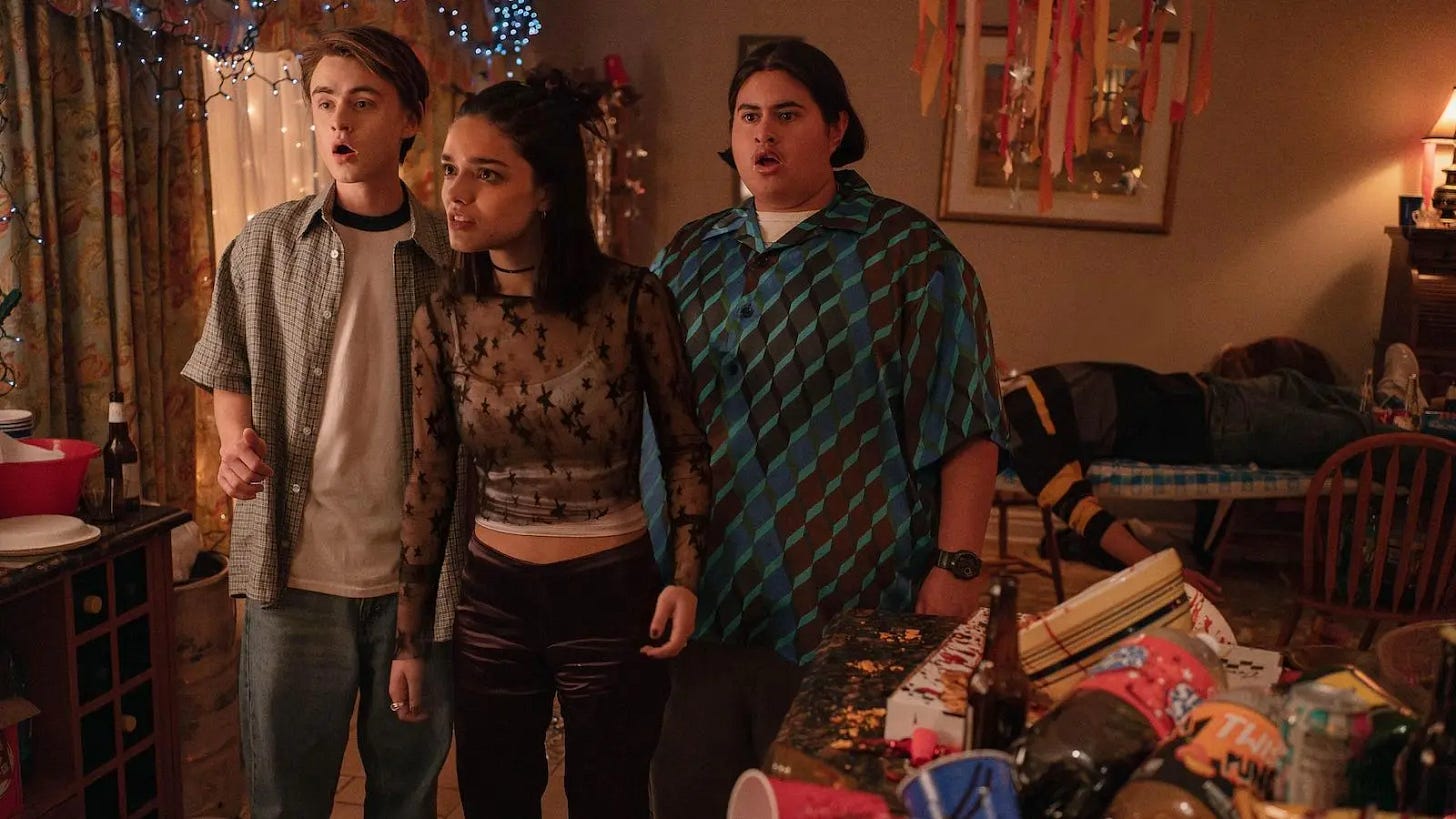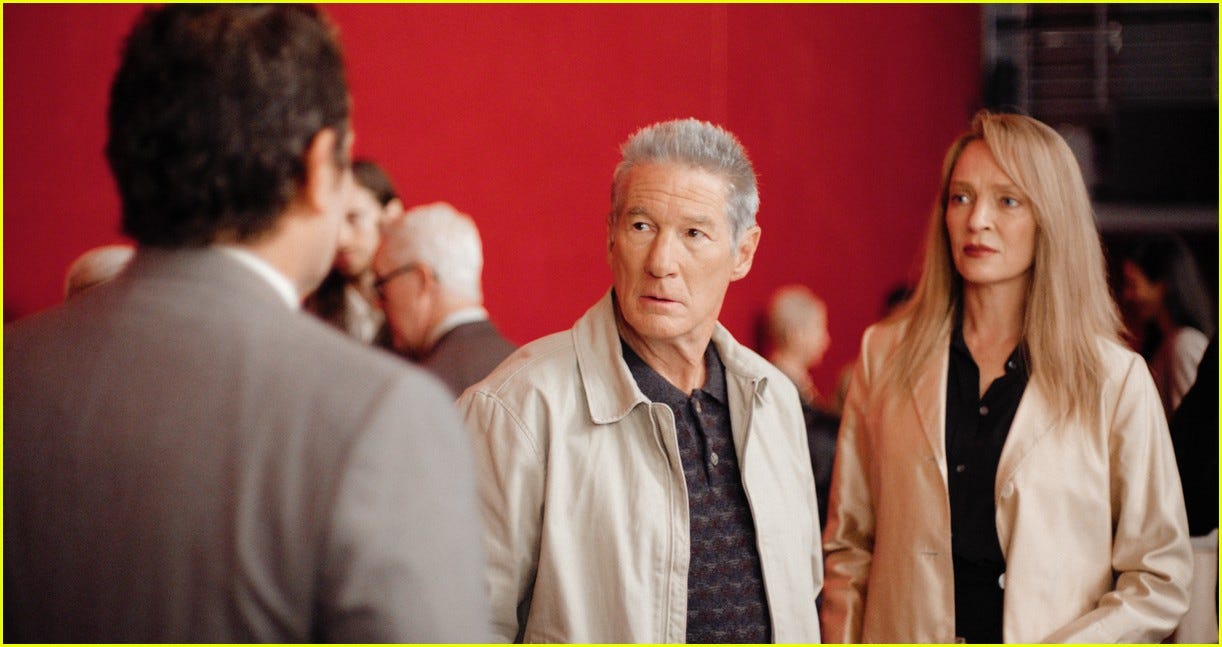In Review: 'Nightbitch,' 'Queer,' 'Y2K,' 'Oh, Canada'
This week's new movies include a retro apocalypse, a woman turning into a dog, a literary titan bumming around Mexico City, and the confessions of an aging radical.
Nightbitch
Dir. Marielle Heller
98 min.
For such a common emotion, maternal ambivalence is a risky proposition for women, both in real life and on the big screen. Being a mother is supposed to be an enriching experience, worth all the sleepless nights and torrential crying jags and other day-to-day hassles, because to think of it any other way is to be an inadequate mother who doesn’t love her child enough. So when Amy Adams, credited simply as Mother in Nightbitch, responds to an innocuous question from a former colleague in the art world about what it’s like to be a stay-at-home mom, it’s not surprising when her bitter monologue about her feelings of anger and detachment is revealed to be a fantasy. Society expects such an exchange to elicit surface-level niceties, like two people talking about the weather. There are consequences to candor.
Yet Nightbitch doesn’t limit itself to the ordinary. Based on Rachel Yoder’s novel, it’s attached to a Cronenbergian conceit where the Mother’s day-to-day stress and frustration in caring for a toddler manifest themselves as a gross, physical manifestation. Coming on the heels of the far more audacious feminist body horror of The Substance, the film can’t help but seem lamentably tame by comparison, as if writer-director Marielle Heller couldn’t work up the nerve to rattle the audience as fully as she might have. The result is a block-that-metaphor situation where the Mother’s literal transformation into an animal lacks the potency to shock while still being prominent enough to make the film’s intentions woefully heavy-handed. The more Nightbitch ventures into the abstract, the worse it gets.
Our Cyber Monday Special is good for the rest of the week. First-time paid subscribers to The Reveal can now save 20% off a one-year subscription. But act fast: this offer ends on Friday.
If soon-to-be parents are going to take any lessons from Nightbitch, let it be this: Sleep train your child. Otherwise, you’re going to end up like Adams’ beleaguered Mother, who spends her nights trying to settle into bed next to a son who needs her to sleep but isn’t always as sleepy as she is. In the narration, Mother talks about ignoring sleep training because she liked the physical bond of having him near her, but now she’s paying a comprehensive price. With her husband (Scoot McNairy) mostly out of town on business, Mother drags herself through the paces of motherhood, venturing out to the grocery store in her pajama bottoms and taking her son to the dreaded sing-a-along sessions at the library, always attended by mothers who seem to have their shit together more.
Once an artist and gallery worker, the Mother has put her career on indefinite hold to commit to her child, but her reward is a fussy and needy boy and a husband whose drive-by parenting, mostly limited to the weekends he’s home, provides inadequate relief. She feels disgusted by her life and herself all the time, and her body starts responding in kind, growing out odd tufts of hair, along with puss-filled warts, extra nipples, and other inexplicable mutations. She eventually turns into a dog, and in the film’s oddest stretch, she starts to encourage her son to adopt canine behavior, too, eating his meals without silverware or curling up for a nap in a dog bed. Perhaps she has reinvented sleep training, after all.
To date, Heller has specialized in adaptations, preceding this film with The Diary of a Teenage Girl, Can You Ever Forgive Me?, and A Beautiful Day in the Neighborhood—all good movies, though built on the conventional foundations of finely tuned performances and a sound sense of time and place. She seems to have lost some of her nerve with Nightbitch, which doesn’t lean far enough into the horror (and comedy) of its animal metaphor and even gets a little touchy-feely about it at times, as if turning into a canine is a passageway to liberation. What’s missing is the insight of her previous films, particularly in the stock marital dynamic between Adams’ overtaxed mom and McNairy’s husband, who’s tagged mostly as a typical guy who doesn’t get it. There are truths aplenty in Nightbitch about the downsides of parenting and how little women especially are able to talk about them, but they don’t run well on four legs. — Scott Tobias
Nightbitch opens this weekend in limited release.
Queer
Dir. Luca Guadagnino
137 min.
There’s almost certainly no conventional way to depict the life or adapt the work of William S. Burroughs. A Beat literature titan, Burroughs wrote hallucinatory, darkly comic prose spun out of a peripatetic existence spent in a global underground populated with addicts, queer people, criminals, and other mid-20th century misfits. Burroughs checked all those boxes (and others), earned notoriety with boundary-pushing books like Naked Lunch and, in later years, became a kind of countercultural elder statesman, clad in suits from another era and speaking in death-haunted creaks set to oddly beguiling rhythms. In some respects, David Cronenberg’s 1992 film Naked Lunch, for all its talking typewriters and bizarre creatures, is a pretty straightforward attempt to make sense of Burroughs’ life and work. Cronenberg depicts Burroughs as a man with a drug-stoked habit of sinking into disturbing hallucinations filled with metaphorical references to his life and enduring obsessions (telepathy, conspiracies, the nature of America, and the occult among them) who’d occasionally emerge and try to put it all into words.
Queer, writer-director Luca Guadagnino’s adaptation of a semi-autobiographical novella Burroughs wrote in the 1950s that remained unpublished until the 1980s, eventually goes down its own hallucinatory road. But for its first hour, the film mostly attempts to play it, for want of a better word, straight. Opening in mid-’50s Mexico City, Queer follows Burroughs surrogate William Lee (Daniel Craig) as he lives the languorous existence of a long-term tourist with nothing to do and enough money to live comfortably while doing it. By day he drifts from cafe to cafe, joined at times by other Americans abroad, most memorably Joe (Jason Schwartzman, stealing scenes), a bearded epicurean constantly complaining about the possessions stolen by the men he brings home. By night he floats from bars to after parties. He hits on other men in the expat community with a variable success rate and pays local sex workers when he strikes out. Then, when he spots the alluring Eugene (Drew Starkey), their eyes meeting as both pass by a cockfight, his life finds focus. But when Eugene’s initial curiosity cools, Lee finds himself at loose ends.
Guadagnino allows this long opening section to play out at a deliberate pace that occasionally feels frustrating by design. Sex brings Lee excitement but does little to offset his isolation when the morning comes. A long scene in which Lee shoots up alone in his room lingers over each step of the process, playing like an attempt to demythologize Burroughs, as does Craig’s engaging, poignant, often funny performance. Rather than the assured, haunted, removed Burroughs who became a public figure (and occasional Nike pitchman) in later years, Lee is driven by nervous energy and a fear of rejection. It’s a portrait of the artist as a young, gun-toting, hat–and-suit-clad weirdo.
When the film hits the road, eventually sending Lee and Eugene into the Amazon in search of yage, the vine used to make ayahuasca, it slowly detaches from the reality of Mexico Cityand, at times, from reality itself, becoming more stylized even before the drugs kick in. As Lee indulges his addiction to opiates more frequently, his relationship with Eugene evolves and changes, becoming first more tender then—upon reaching the remote research station run by Dr. Cotter (an unrecognizable Lesley Manville), the botanist studying yage—even harder to define than before.
So, too, does the film, which almost expects viewers to know at least a little about Burroughs going in, particularly the alluded to but never explicitly mentioned incident that took place shortly before the book’s composition and hangs like a specter in the background of the film: the shooting death of Burroughs’ wife Joan Vollmer, which Burroughs alternately described as an accident and a William Tell-inspired party trick gone horribly awry. Queer is both livelier and less satisfying in its more unpredictable, sometimes elliptical second half, but Craig’s performance provides an anchor, grounding even its oddest turns in Lee’s roiling emotions and fear of being alone. Guadagnino, as ever, takes chance after chance with the film. Some seem puzzling—like a soundtrack filled with tracks by Nirvana, Prince, New Order and more—while others, like a trip to see Jean Cocteau’s Orphee, play like thematically resonant grace notes in what’s ultimately the story of a lost soul struggling to keep from forever floating away. —Keith Phipps
Queer is currently in limited release.
Y2K
Dir. Kyle Mooney
93 min.
Buried deep in Y2K, a new sci-fi horror comedy directed by Kyle Mooney from a script co-written by Mooney and Evan Winter, you’ll find an interesting question: What if the last real moment of cultural innocence came to an end with the disappearance of dial-up modems? By the end of the ‘90s, the internet was everywhere but, for everyday users, it involved tying up a phone line and a lot of waiting. You could be online, but not very online. We may have found a way to destroy ourselves with our own technology even if Y2K, the feared programming bug some believe would cause a technological collapse when 1999 rolled over to 2000, never happened.
But what, Y2K asks, if it had? That’s the peril a group of high schoolers are forced to confront after ringing in the New Year, and not in a form as mundane as, say, the lights going out. Best friends Eli (Jaeden Martell) and Danny (Julian Dennison) begin December 31st, 1999 with relatively low expectations, making no concrete plans beyond hanging out and watching the Arnold Schwarzenegger-gets-pregnant comedy Junior. But the more outgoing Danny wants to go to a party and Danny knows Eli wants to go, too, or at least wants to be in the general orbit of Laura (Rachel Zegler), a popular girl with a knack for technology with whom Eli has an ongoing online flirtation. Maybe. It’s hard to tell for sure. The party doesn’t go well, at least for Eli. Then, once machines start going full Maximum Overdrive, it doesn’t go well for anyone.
The gifted Mooney, who plays a supporting role as a dreadlocked, perpetually stoned video store clerk, has a gift for disorienting comedy and millennial cultural references, both on SNL and elsewhere. (If you missed his Netflix series Saturday Morning All-Star Hits!,give it a look.) Yet as odd as it is to say this about a movie in which teens fight killer robots, sometimes alongside the most 1999 music superstar imaginable (don’t look up the credits if you want to be surprised), the weirdest thing about Y2K is how un-weird it often plays. An early scene in which the camera moves from one broadly delineated high school clique to the next, for instance, passes up the chance to parody a well-established trope and just leans into it. It’s an odd mix of familiar teen movie jokes (with a particular debt to Superbad), absurdism, and sincerity. Like the characters’ hybrid electronic foes, the pieces fit together, but the results are pretty clunky. It’s kind of funny, kind of touching, and kind of scary but all the kind-ofs never add up to a movie that works. —Keith Phipps
Y2K arrives in theaters tonight.
Oh, Canada
Dir. Paul Schrader
91 min.
In one of his typically colorful provocations—now maybe the primary reason to log onto Facebook—Paul Schrader once talked about how he made films as a director that he would not have liked as a critic. Yet it feels like his last few films may have impressed the scholar who once wrote Transcendental Style in Film: Ozu, Bresson, Dreyer, given how much the asceticism and moral gravity of work like First Reformed, The Card Counter, and Master Gardener has echoed his heroes, Robert Bresson especially. As Schrader approaches the end of his career—and, given his numerous recent health scares, perhaps his life too—Schrader seems to be making films as if they were a final statement, each feeling like a last-ditch trip to the confessional.
On that front, Oh, Canada is an important piece of work for Schrader, even if it’s the least successful of his current and most vital run of films. Based on the 2021 novel Foregone by Russell Banks, the late Canadian author who he’d adopted previously with 1997’s Affliction, the film may not feature a narrator scribbling his thoughts into a diary like a typical Schrader or Bresson hero, but he’s putting himself on the record all the same. Reuniting with Richard Gere over 40 after making him a sex symbol in American Gigolo, Schrader casts the diminished (if still dashing) star as Leonard Fife, an acclaimed writer and nonfiction filmmaker who’s wheezing through the end stage of a terminal cancer diagnosis. Two of Fife’s former students, Malcolm (Michael Imperioli) and Diana (Victoria Hill), have convinced him to participate in their own documentary about his career, which they assure him will bolster his legacy.
Fife has other ideas. As Malcolm, using a device that resembles Errol Morris’ “Interrotron,” starts running through the 20 questions he and Diana have prepared for their former mentor, Fife immediately hijacks the project by telling the story he wants to tell, only it’s not nearly as flattering as one might expect. With his current wife (and former student) Emma (Uma Thurman) by his side, Fife upends the cozy narratives that have been constructed around his supposedly conscientious draft-dodging and subsequent career making socially progressive docs about Agent Orange, sexual assault in the priesthood, and environmental catastrophe. He mostly understands himself as a fraud and seeks defiantly to set the record straight, no matter how much harm it exacts on his reputation and on his wife’s feelings.
Given that the core of Oh, Canada is Fife narrating his life to the camera, Schrader goes overboard in experimenting with various cinematic conceits, most notably the casting of Jacob Elordi, an actor half a foot taller than Gere, as his younger self in flashbacks. Not only that, Schrader also toggles back and forth between using Elordi and Gere within the same time frame and, more mysteriously, casts Thurman in a second role as one of the many women Fife burned through as a dashing intellectual. Between those awkward devices and the almost doddering fluidity with which the film moves to different timelines, Oh, Canada teeters on the edge of incoherence, never quite finding the emotional clarity that’s defined Schrader’s recent hot streak.
Still, Oh, Canada is a boon for Schrader auteurists and anyone else who appreciates the prickliness that he’s willing to preserve without a thought to commercial implications. He even reveals Fife’s eagerness to tarnish his own image as its own kind of selfishness, because it’s so acutely painful to the one woman he still has in his corner. What emerges from Oh, Canada is a character who wants to salvage a piece of his soul by immolating himself, which ironically proves that there’s some integrity left to him, along with honest regret about past mistakes and a career that more stumbled-upon than earned. It’s a difficult film by a difficult filmmaker—and, if it turns out to be Schrader’s last, he will have written his own appropriate scabrous eulogy. — Scott Tobias
Oh, Canada opens today in limited release.













It’s a shame about Y2K (I haven’t heard many positive things about it since it premiered at SXSW) because I like Mooney’s BRIGSBY BEAR (which he co-wrote and starred in) a lot.
I’ve already seen OH, CANADA, so the one of these I’m most eager to catch is QUEER.
I’m bummed that Nightbitch isn’t as good as I’d hoped (I still plan to see it). But a big co-sign on sleep training! It can be a drag but the payoff is huge, for all involved.